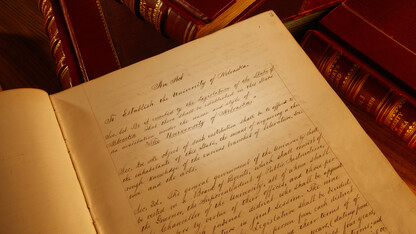
The opening day of the 31st annual Science Olympiad National Tournament was a smashing good time — especially for sumo bot and egg drop contestants.
Hosted by UNL May 14-16, the three-day event included more than 2,000 middle- and high-school students from across the nation competing in categories ranging from earth science and chemistry to physics and engineering. The national tourney, which is held at a different university each year, is the culmination of regional and state tournaments.
After arriving on campus on May 14, teams participated in a STEM (science, technology, engineering and math) Expo in Jorgensen Hall on May 15. The expo included the sumo bot competition, tours of UNL facilities (including the Voetle-Keegan Nano Center and the Diocles Extreme Light Laboratory), hands-on science experiments, and booths representing UNL colleges and event sponsors.
Jon Velasco, a graduate student in chemistry, spent most of the event guiding science Olympians through an experiment that gauged levels of vitamin C in various drinks.
“All of these kids are amazing,” Velasco said. “They are engaged and excited about science. They want to know more and ask great questions.
“Hosting the Science Olympiad is a great opportunity for UNL.”
In another Jorgensen Hall room, student-controlled sumo bots clashed for superiority inside a tape ring. The competition — which features robots built by the students — is won by pushing an opposing sumo bot outside of the ring.
Students crowded around a window to watch as teams from Connecticut and Oklahoma advanced to the finals.
Prior to the opening ceremonies on the evening of May 15, Omaha-area science students worked with local officials to build protective cages for an egg drop competition at the Devaney Sports Center.
Armed with bubble wrap, cotton batting, foam padding and tape, the four teams spent 20 minutes building the protective cages. The designs were then dropped from a height of about 20 feet. Points were awarded for the amount of weight added to the egg, the distance the cage landed from the target and if the egg survived the drop.
The team that included Britney Brown, Husker women’s basketball assistant coach; David Brown, president of the Omaha Chamber of Commerce; and students Jacob Carter and Alex Plowman won the competition.
Other executive team members included: Tim Gay, UNL physics professor, and Pete Ricketts, Nebraska governor; Chris Beutler, Lincoln mayor, and Tracy Wolf-Freeouf, U.S. Army Corps of Engineers; and Archie Clutter, dean of UNL’s Agricultural Research Division, and Walter Powell, TeamMates mentoring program.
The Science Olympiad concluded May 16 with a day of science competitions. Events included “The Wright Stuff,” where students build flying machines; “Storm the Castle,” involving catapults used to destroy castle wall props; and a competition to build Rube Goldberg-like contraptions.
The event awarded 47 gold medals. Each student who earned gold was offered a full scholarship to attend UNL. Out-of-state students winning gold qualify to receive a George Beadle Scholarship, worth $13,500 per year for four years at UNL. Nebraska students claiming a top award can receive free tuition for 120 credit hours, which is equal to a bachelor’s degree.
Other prizes — including cash, tours of science facilities around the United States, medals and trophies — were also awarded.













